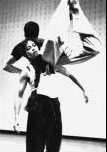

For her Winter Term project Oberlin senior Heather West organized a February 28 speakers series--Deaf Culture, Deaf Identity, and Oppression of the Deaf Community--for which Brooksley Williams '93 returned to campus. Brooksley interpreted for Arlene Kelly, Gallaudet University professor of deaf studies, whose presentation was entitled "What Is Deaf Studies All About?" Both Brooksley and Heather became interested in deaf studies after spending a semester at Gallaudet on an exchange program, Heather in spring 1996 and Brooksley in 1991. Brooksley later was a student teacher at Con-necticut's American School for the Deaf, and cotaught, with a deaf student from Gallaudet, an EXCO course on sign language and the deaf community. She now inter-prets classes at the University of Maryland and is a free- lance interpreter in the Washington, DC, area.
"Don't censor yourself. Share with your colleagues. Be embarrassed," were some of the instructions Seth Bauer '93 gave students enrolled in his April 16 playwriting master class. The assignment: write the worst play possible in no more than an hour. "Every cliché has a home in this play," said Seth, who further directed the budding writers to "have fun. Write nakedly. Take risks. Be bloody, bold, and resolute." Seth has seven plays and three screenplays to his credit; his latest play, The Burglar of Suburbia, premiered last summer in Austin, Texas, and another, The Tip, received a Drama League New Visions New Works grant, which includes an off-Broadway production, scheduled for this fall at St. Clement's Church. The Tip was, in May, a finalist for development by the 1997 Sundance Theater Institute. An Oberlin theater major, Seth earned an MFA in playwriting at the University of Texas at Austin, where he thrice received the Texas Center for Writers' prestigious James A. Michener Fel-lowship. Seth is arts outreach supervisor for the Texas Young Playwrights' Festival, but he plans a fall move to New York City, where he'll supervise production of The Tip.
| Twenty-five years ago Nancy Stark Smith '74 joined Steve Paxton, Curt Siddall, and others for a series of dance performances directed by Paxton at New York's John Weber Gallery, a collaboration that launched the dance form now known as Contact Im-provisation, or, simply, Contact. Contact focuses on com-munication through points of physical contact, says Nancy, and facilitates a conscious, engaged dancing with others, using such skills as rolling, sharing balance, giving and receiving weight, and falling softly. Cofounder and coeditor of Contact Quarterly, Nancy has played a prominent role in developing and teaching Contact. She and Paxton met during a '70s Winter Term experimental choreography residency by the dance collective the Grand Union. Both returned this spring to Oberlin as guest artists in the dance program's year-long celebration of Contact's 25th anniversary, which culminated in an international conference held on campus June 3-15, produced by Contact Collaborations, Inc. |  |
| Smith and Paxton |
Barbara, cofounder of the National Women's Network, was uniquely
qualified to lead the session entitled "Historical Politics of
Contraception and Informed Consent." A central figure in the women's
health movement, Barbara wrote the 1969 classic, The Doctor's
Case Against the Pill, which has been re-released in a 25th anniversary
edition. Herbert is enrolled in Johns Hopkins's School of Public
Health and works as a public-policy as-sociate for the Sexuality
Information and Education Coun-cil of the United States. She spoke
about women's health activism after graduation.

Barbara Rosner Seaman '56 and Sonja Herbert '91 were back in Oberlin April 26 to present sessions at the
Women's Health Conference, sponsored by Oberlin Students United
for Reproductive Freedom (OSURF).
--Midge Wood Brittingham '60 is executive director of the Oberlin College Alumni Association.